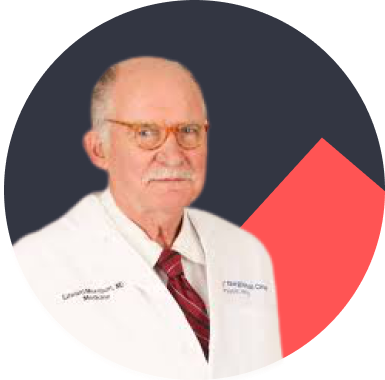How to Lead the System with
Dr. Robert Morrison

A Conversation with Dr. Robert Morrison
“We, as physicians, have got to be the leaders. We have to advocate doing the right thing for our patients. The right thing for the patients is the right thing for everyone, always.”
Bio
Robert Morrison, MD is a Professor of Medicine at the University of Tennessee Health Science Center. Dr. Morrison received his medical degree from Indiana University School of Medicine in Indiana, IN. He completed his internship and residency in internal medicine at Fitzsimons Army Medical Center in Colorado. Dr. Morrison went on to complete his fellowship in infectious diseases at Walter Reed Army Medical Center in Washington, DC. Dr. Morrison’s career spans from serving in the US Army for 20 years and as the chief of medicine and program director for an army training hospital, to his current role as a clinician educator in the Department of Medicine at the University of Tennessee Health Sciences Center.
What are some key experiences that marked your early journey into medicine?
“I think the earliest thing I can remember is, my mother worked for a doctor when I was about three or four years old in a small town. And I incorporated the desire to be a doctor like him at that time,” Dr. Morrison began. “And in my play and in my thoughts, that was my direction. And I think I was very fortunate in that respect. There was never any question about why I needed to study hard, I needed to understand, listen and learn because I wanted that so much.”
From that early journey, Dr. Morrison completed an undergraduate degree in his home state of Indiana in 1964. Being new to his field, he realized mentorship was important. Two influential figures in his life included Dr. Malcolm Artenstein (co-discoverer of the rubella virus) and Dr. Bruce Brundage (Chief of cardiology at the University of Illinois). Both coached Dr. Morrison from different perspectives. Dr. Artenstein helped Dr. Morrison with his academic papers by providing constructive feedback, while Dr. Brundage coached Dr. Morrison from a more hands-on perspective as they worked together on numerous patients in different wards and clinics.
Work ethnic and knowing yourself. These are two critically important attributes. As someone who had grandparents who went through World War I, World War II and the Great Depression, Dr. Morrison learned much about the value of persistence. And along with this, he developed a heightened respect for every patient he encountered. In his words, “We respect our patients because they come from the same ground of being that we do.”
Why do you emphasize the importance of spirituality, faith, experience, and suffering?
“We have to look deeply into ourselves, and we have to look deeply into our greatest fears,” Dr. Morrison points out. “All the great religions and some philosophers have pointed to this.”
Dr. Morrison goes on to note that we live in a beautiful world and that the reason people make mistakes is because they cannot see life properly. He is optimistic that out of this Covid-19 season, there will be a renewed sense of hope that people have.
Personal experience is important to Dr. Morrison for several reasons. “The experience part is a lower part of the forebrain, it’s not up here where you have all these words and everything going on. The deeper part of your brain is a part of you that’s always been there, that knows the knower. If you say, ‘I am the knower,’ then it’d say, ‘Who is the I that knows the knower?’ And then you’ll say, ‘Well, who is the knower who knows the knower that knows the I?’ And you’ll find that that will give you an experience where what you have is a feeling of I am. It’s a feeling of being. That’s all it is, it’s pure being.”
How do we start the process of knowing who we are?
“Start by turning off your mind that is telling you what you are, and experience what you really are,” Dr. Morrison responded. “And in terms of listening, a good way to really listen is to get inside yourself and be that person that you are and listen and observe the person you’re talking to. You really see them, you communicate with them, you don’t just send up a smoke screen of words.”
Dr. Morrison goes on, “Your feelings are part of your person. Your whole body generates your feelings, your brain generates and interprets those feelings and generates your mind, but your person is the silent watcher. It’s there. It doesn’t have to talk because it says everything. As I said, it’s the infinite regression. And when you get to infinity, it’s almost as good as getting to nothing.”
How do you balance running an enterprise and providing care that is cost effective?
For Dr. Morrison, physician leadership is critical. Find the people in places of authority who care and talk to them. “We, as physicians, have got to be the leaders. We have to advocate doing the right thing for our patients. The right thing for the patients is the right thing for everyone, always.”
Even though navigating this tension of business and care is difficult, there is hope. “Sometimes there are actually doctors who are CEOs of hospitals, and sometimes they understand when you talk to them. And get them to explain to you why you have to do it that way. Because you can generate change.”
Dr. Morrison is a strong believer in leading yourself before instructing others. “Your actions begin with you, and you don’t work alone, you work in a system.”
What are the traits and habits of the most successful medical students or residents that you’ve come across?
“They have a great curiosity. They’re interested, they want to know,” Dr. Morrison reflected. Personal integrity is also a massive quality to have. Being someone who is trustworthy and will make accurate statements about their patients is important.
Further reflecting on this question, Dr. Morrison continues, “They have integrity, they have respect, they show the patients great respect. They don’t think of the patient as being something of another checklist to check off.”
Application is critical. Successful medical students or residents are constantly looking for ways to develop their skills and apply what they are learning to their patients. “They don’t just talk about it; they go in and use them.”
The final trait Dr. Morrison mentioned briefly is attitude. Consider it a joy to be a physician and begin each day with a positive outlook.
Pearls of Wisdom
- Everything begins and ends with the patient. In the words of Sir William Osler, “We begin with the patient, stay with the patient, and end with the patient.”
- We can better avoid burnout when we view ourselves as leading the system, rather than working for it.
- If we want to do the right thing, sometimes we need to think outside the box and align the needs of the institution and businessman without sacrificing the needs of our patients.
